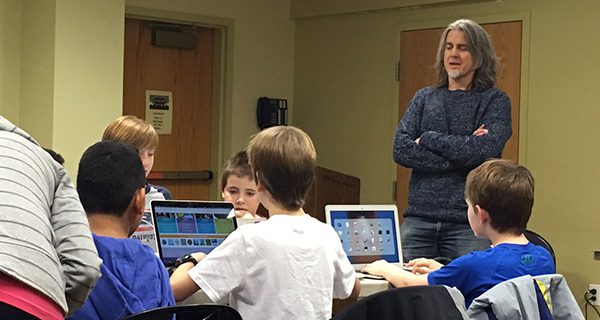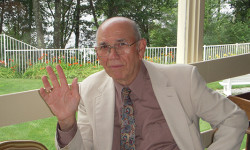[ccfic caption-text format="plaintext"]
By Katrina Margolis
Hometown Weekly Reporter
Each and every person uses computers every single day, whether it’s a smart phone, a car, a watch, or a television. However, many are not aware of the actual inner workings of computers and the capabilities that they offer. John Quackenbush decided to try to change that by leading an Hour of Code for kids ranging from first to sixth grade. Hour of Code is actually a week-long national project begun by Code.org, who believed that understanding the building blocks of coding is important for everyone. While this hour was not officially affiliated with Code.org, John used their resources to introduce the beginnings of coding and encouraged all kids in attendance to continue on with the national event.
John is a scientist at Dana-Farber Cancer Institute as well as a Professor of Computational Biology at the Harvard T.H. Chan School of Public Health. “That means that I write a lot of code. I could show you some of the programs that my group writes, but I don’t think it’s all that interesting. I think it’s more interesting to show you what you can do,” John said to the kids. Mary, his wife, explained how this event came to be. “Adam, our son, always participates in Hour of Code, and so John wanted to do something and invite some of the other kids. There’s about a dozen kids coming,” she said. Both Mary and John are huge proponents of Hour of Code. “It’s a week of activities designed to promote computer literacy,” she explained.
The website provides activities set up much like games to help understand the basic concepts behind coding, if not the actual syntax of programming. John began by asking the kids a series of questions that anyone could understand. “What’s a computer? It’s a machine! What makes a computer really special is that they can do almost anything. You can program them and give them programs to have them do almost anything you want, that’s what makes them interesting and kind of fun,” he said. “Do you know what a program really is? What a program really is, is giving it a list of instructions to tell it to do something.”
While these kids may not be building and programming robots this week, understanding the building blocks of computers is important not only in understanding their day-to-day function, but for being able to compete in a modern job force. By beginning at a young age, these kids will have an extreme advantage over those without this knowledge.

























